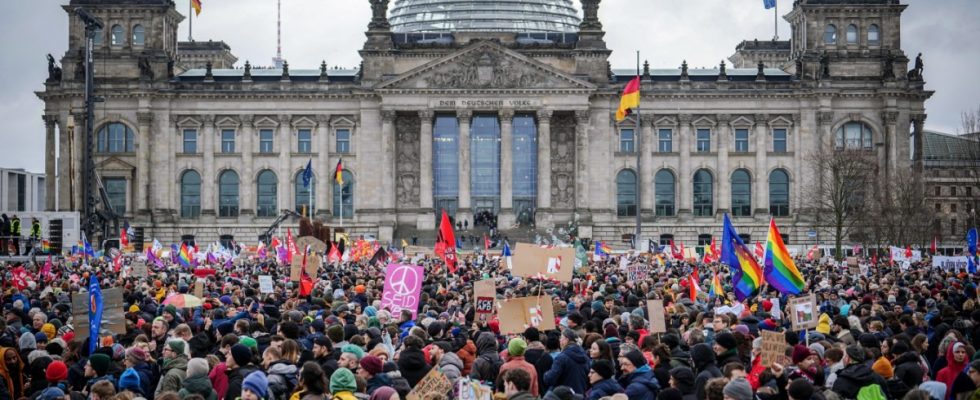After the new demonstrations against right-wing extremism, the debate about how to further deal with the AfD is intensifying. At the weekend, several hundred thousand people across Germany took to the streets again to show a sign of protest against the far-right party. In Berlin alone, according to police estimates, 150,000 participants gathered in front of the Reichstag building. The rallies were welcomed by all other parties. Chancellor Olaf Scholz (SPD) wrote on Platform X that the demonstrations were “a strong sign for democracy and our Basic Law.” Several representatives of the traffic light parties themselves took part in the protests, including SPD leader Saskia Esken, ministers Karl Lauterbach and Svenja Schulze and Green politicians Omid Nouripour and Katrin Göring-Eckardt.
However, there was criticism from the opposition: The Left sees the traffic light coalition as partly responsible for the AfD’s strengthening. “It is not enough for the federal government to welcome the protests,” said party leader Janine Wissler South German newspaper. Concrete measures are needed “to eliminate grievances that form a breeding ground for the rise of the right.” Many people felt exhausted “by increasingly poor living conditions”. Wissler and her co-chair Martin Schirdewan propose a four-point program that calls for major investments in the social system and infrastructure: The state should invest in affordable housing, public transport and the care and health system. In addition, dilapidated railways, bridges and public facilities would have to be modernized and the prices for food, energy and rents would have to be capped. The necessary “special program worth billions” was possible, said Wissler: “It wasn’t a problem for the military and defense companies.” In addition, programs to promote democracy need to be better supported.
CSU leader Markus Söder also spoke up: The AfD is “a deeply right-wing extremist party,” said Bavaria’s Prime Minister Rhenish Post. He called for the party to focus more on content – many statements from AfD representatives “disgusted” him. At the same time, Söder positioned himself as a representative of a tough course in migration policy: “We have to move away from the individual right to asylum towards an objective claim,” said Söder. Subsidiary protection, which protects refugees from deportation because they may not be safe in their home country, should be revised. “For example, we have to check whether deportations can be made to certain parts of Syria,” said Söder. In addition, the citizen’s allowance should be canceled “for someone who comes to Germany for the first time.”
In surveys, approval ratings for the AfD have fallen since the protests began. According to a survey by the elections research group for the ZDF political barometer, 19 percent of those eligible to vote would currently vote for the AfD. That is three percentage points less than the last survey in mid-January and the lowest value for the party in seven months.
According to protest researcher Tareq Sydiq from Marburg’s Philipps University, the demonstrations against right-wing extremism and the AfD could lead to a long-term protest movement. Sydiq told the dpa that the decisive factor for the continued existence of the movement is whether the participants form alliances and agree on common goals and strategies. It is also noticeable that several parties say they are recording a significantly increasing number of new entries: the Left, SPD, Greens and CSU confirmed this star significant increases – as well as the AfD.
Its chairman Tino Chrupalla accused other parties of instrumentalizing the rallies. It was “legitimate to take to the streets with the government,” he said on Deutschlandfunk. But the demonstrators should not allow themselves to be used so that parties can distract from the actual problems in the country. Chrupalla called on all sides – including his party – to moderate language. Germany also includes Germans with a migration background, he emphasized. His party does not plan to expel them.
The trigger for the current protests is the rise of the AfD and a meeting of radical right-wingers in Potsdam last November, which only recently became known. AfD politicians and individual members of the very conservative Values Union are said to have taken part in the meeting. Apparently plans were discussed to force people with a migration background to leave Germany.

